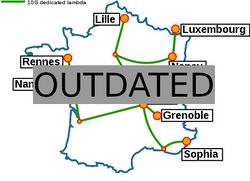Grid5000:Home
|
Grid'5000 is a large-scale and versatile testbed for experiment-driven research in all areas of computer science, with a focus on parallel and distributed computing including Cloud, HPC and Big Data. Key features:
Grid'5000 is merging with FIT to build the SILECS Infrastructure for Large-scale Experimental Computer Science. Read an Introduction to SILECS (April 2018)
Older documents:
|
Random pick of publications
Five random publications that benefited from Grid'5000 (at least 2517 overall):
- Chih-Kai Huang, Guillaume Pierre. Acala: Aggregate Monitoring for Geo-Distributed Cluster Federations. SAC 2023 - 38th ACM/SIGAPP Symposium On Applied Computing, Mar 2023, Tallinn, Estonia. pp.1-9. hal-03899133 view on HAL pdf
- Michail Georgoulakis, Verena Kantere, Laurent D’orazio. Multi-objective query optimization in Spark SQL. IDEAS 2022 - International Database Engineered Applications Symposium, Aug 2022, Budapest, Hungary. hal-03925675 view on HAL pdf
- Ilhem Fajjari, Wassim Aroui, Joaquim Soares, Vania Marangozova. Use Cases Requirements. UGA (Université Grenoble Alpes). 2024. hal-04450028 view on HAL pdf
- Jose Jurandir Alves Esteves, Amina Boubendir, Fabrice Guillemin, Pierre Sens. On the Robustness of Controlled Deep Reinforcement Learning for Slice Placement. Journal of Network and Systems Management, 2022, 30 (3), pp.43. 10.1007/s10922-022-09654-8. hal-03954527 view on HAL pdf
- Houssam Elbouanani, Chadi Barakat, Thierry Turletti, Walid Dabbous. Demo paper : Fidelity-aware Distributed Network Emulation. IEEE Conference on Standards for Communications and Networking, Nov 2022, Thessaloniki, Greece. hal-03857802 view on HAL pdf
Latest news
Failed to load RSS feed from https://www.grid5000.fr/mediawiki/index.php?title=News&action=feed&feed=atom: Error parsing XML for RSS
Grid'5000 sites
Current funding
As from June 2008, Inria is the main contributor to Grid'5000 funding.
INRIA |
CNRS |
UniversitiesUniversité Grenoble Alpes, Grenoble INP |
Regional councilsAquitaine |


